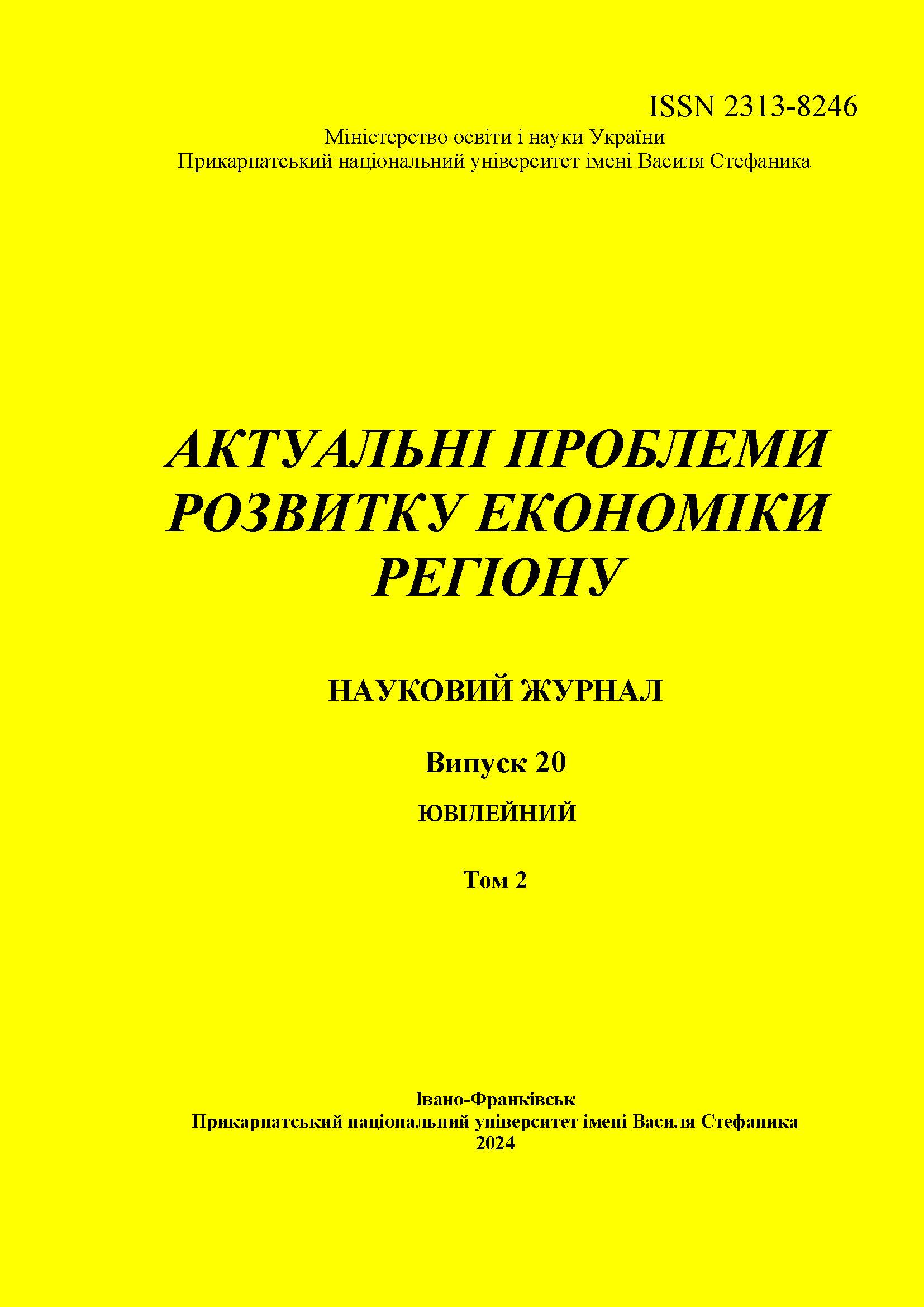PROGRESS OF COUNTRIES IN ACHIEVING SUSTAINABLE DEVELOPMENT GOALS: THE ROLE OF EDUCATION
DOI:
https://doi.org/10.15330/apred.2.20.20-31Keywords:
sustainable development, quality of education, green growth index, environmental performance index, sustainable development index, Sustainable Development GoalsAbstract
The article is devoted to the study of the progress of countries in achieving the UN Sustainable Development Goals, in particular the role of education in this process. It is proved that for all countries, without exception, sustainable development is inextricably linked to the processes of ensuring the environmental efficiency of country development and building a green economy.
The Sustainable Development Goals are an important indicator of the harmonious, balanced and secure development of countries around the world. Green growth and sustainable development are interconnected and complementary processes, and sustainable development is impossible without the fullest possible implementation of the principles of green growth.
The article assesses the interrelationships between the processes of ensuring sustainable development, environmental efficiency and green growth on the example of the European Union and Ukraine. The progress of countries in achieving the 17 UN Sustainable Development Goals is measured by the Sustainable Development Goals Index. The article confirms that European countries have the highest results in achieving the Sustainable Development Goals, but after the outbreak of the pandemic in 2020 and other simultaneous crises, progress in achieving the Sustainable Development Goals has stopped worldwide.
Using multidimensional assessment tools, the impact and relationship of sustainable development goals with the relevant index were determined. Particular attention was paid to analysing and establishing the relationship between the level of sustainable development and the quality of education. It is determined that achievement of the sustainable development goals depends on strengthening the role of education and research aimed at environmental protection, joint efforts in solving environmental problems and development of environmental education. Therefore, universities have a special role to play in the implementation of the Sustainable Development Goals set by the UN.
Ukraine supports the achievement of the Sustainable Development Goals and the results of their adaptation, taking into account the specifics of the country's development. Given Ukraine's accession to the European Union's policies and standards, achieving the goals of the 2030 Agenda for Sustainable Development is critical for Ukraine's post-war recovery and reconstruction.
References
Gerasymchuk, Z. V. Regional policy of sustainable development: theory, methodology, practice. Lutsk, Nadstyr'ya, 2008.
Kates, R., Parris, T., and A. Leiserowitz. “Great Transition Values: Present Attitudes, Future Changes.” GTI Paper Series, no. 9, 2006, www.greattransition.org/archives/papers/Great_Transition_Values.pdf. Accessed 25 Feb. 2024.
Anisimova, G., and O.Donets. “Ecologisation of higher education as a priority direction of the state environmental policy: modern organisational and legal aspects.” SCIENTIFIC AND RESEARCH INSTITUTE of providing legal framework for the innovative development, ndipzir.org.ua/wp-content/uploads/2016/05/Conf_25.05.16/Conf_25.05.16_2.pdf. Accessed 25 Feb. 2024.
Kyrychenko, K., Laznenko, D., and Ya. Reshetniak. “Green University as an Element of Forming a Sustainable Public Health System.” Health Economics and Management Review, no. 4, 2021, pp.21-26, http://doi.org/10.21272/hem.2021.4-0.
“Sustainable Development Report 2023.” AWS, s3.amazonaws.com/sustainabledevelopment.report/2023/sustainable-development-report-2023.pdf. Accessed 25 Feb. 2024.
“Green Growth Index.” Global Green Growth Institute, 2023, gggi-simtool-demo.herokuapp.com/. Accessed 25 Feb. 2024.
Environmental Performance Index. Yale Centre for Environmental Law & Policy, epi.yale.edu/. Accessed 25 Feb. 2024.
“Sustainable Development Goals: Ukraine. National report.” Gov.ua www.kmu.gov.ua/storage/app/sites/1/natsionalna-dopovid-csr-Ukrainy.pdf. Accessed 25 Feb. 2024.
“Sustainable Development Goals and Ukraine.” gov.ua, www.kmu.gov.ua/diyalnist/cili-stalogo-rozvitku-ta-ukrayina. Accessed 25 Feb. 2024.
“Sustainable Development Goals 2016-2030.” undp, www.undp.org.ua/ua/tsili-rozvytku-tysiacholittia/tsili-staloho-rozvytku. Accessed 25 Feb. 2024.
On the Sustainable Development Goals of Ukraine for the period up to 2030: Decree of the President of Ukraine No. 722/2019. President of Ukraine, www.president.gov.ua/documents/7222019-29825. Accessed 25 Feb. 2024.
“Every day of delayed peace will accelerate a freefall into poverty for Ukraine, warns UNDP 2022 (16 MARCH)”, www.undp.org/press-releases/every-day-delayed-peace-will-accelerate-freefall-poverty-ukraine-warns-undp. Accessed 25 Feb. 2024.
World Bank. Ukraine Rapid Damage and Needs Assessment: February 2022 - February 2023.Washington, D.C.: World Bank Group, documents.worldbank.org/curated/en/099184503212328877/P1801740d1177f03c0ab180057556615497. Accessed 25 Feb. 2024.
“Coordination of the implementation of the Sustainable Development Goals.” gov.ua, www.kmu.gov.ua/diyalnist/cili-stalogo-rozvitku-ta-ukrayina/koordynatsiia-implementatsii-tsilei-staloho-rozvytku. Accessed 25 Feb. 2024.
“The Sustainable Development Goals are an integral part of the Recovery Plan for Ukraine.” 2022 (26 September). Undp, www.undp.org/uk/ukraine/press-releases/tsili-staloho-rozvytku-nevidyemna-chastyna-planu-vidnovlennya-ukrayiny. Accessed 25 Feb. 2024.
Downloads
Published
How to Cite
Issue
Section
License

This work is licensed under a Creative Commons Attribution-NonCommercial-NoDerivatives 4.0 International License.
- Authors retain copyright and grant the journal right of first publication with the work simultaneously licensed under a Creative Commons Attribution NonCommercial NoDerivs 4.0 Unported License that allows others to share the work with an acknowledgement of the work's authorship and initial publication in this journal.
- Authors are able to enter into separate, additional contractual arrangements for the non-exclusive distribution of the journal's published version of the work (e.g., post it to an institutional repository or publish it in a book), with an acknowledgement of its initial publication in this journal.
- Authors are permitted and encouraged to post their work online (e.g., in institutional repositories or on their website) prior to and during the submission process, as it can lead to productive exchanges, as well as earlier and greater citation of published work (See The Effect of Open Access)


